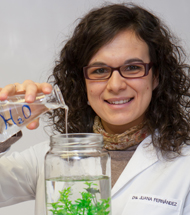Juana Fernández Rodríguez, Professor of Environmental Sciences, University of Navarra, Degree
Women, climate change and vice versa
 Last Tuesday, October 16, I had the opportunity to attend to the workshop held in Baluarte under the name of degree scroll Women and Climate Changeorganized by the Government of Navarra. The main objective of goal was to make women visible in the environmental sustainability of the Planet. For this purpose, there were two panels: one focused on the political approach and the second on knowledge and social movements. meeting included a previous session at work where women managers of companies and organizations prepared a declaration entitled "Women in environmental sustainability".Active for the Climate. Navarra 2018"read and referenced at various times.
Last Tuesday, October 16, I had the opportunity to attend to the workshop held in Baluarte under the name of degree scroll Women and Climate Changeorganized by the Government of Navarra. The main objective of goal was to make women visible in the environmental sustainability of the Planet. For this purpose, there were two panels: one focused on the political approach and the second on knowledge and social movements. meeting included a previous session at work where women managers of companies and organizations prepared a declaration entitled "Women in environmental sustainability".Active for the Climate. Navarra 2018"read and referenced at various times.
If we leave aside the political heterogeneity, one of the points common to all the interventions was the empowerment of women. Emphasis was placed on our distinctive features compared to men as tool to carry out environmental conservation projects with application internship for citizens. In addition, the speakers agreed on the transversality of the fight against climate change and the convenience -as I interpreted it- of including women in multidisciplinary issues to achieve a relevance that positions them as leaders. The role of men as an unavoidable brake on climate change was not ignored, but some attendees were surprised by the scarcity of men attendance .
The role of women in society and in the environment was also discussed, and some very interesting concrete measures and projects were presented, focused on facilitating the use of public transport to move around the city - some surveys indicate a higher rate of use among women than among men for commuting to work- or on promoting the use of bicycles to encourage women to travel to industrial estates located in the outskirts of the city.
Recent environmental reports have raised alarm bells about the growing generation of waste by an over-consumptive society. From a global point of view, the waste generated and the raw materials used for the production of new goods are directly related to climate change. In this sense, one of the most relevant points of the workshop was, precisely, the visit to the facilities of Traperos de Emaús, in Berriozar.
There, we were welcomed with a"zero waste" lunch: water served in glass bottles and glasses, metal cutlery, cloth napkins and tablecloths, ceramic plates, etc. All washable and reusable. They enthusiastically explained to us their project, which consists of a non-profit foundation under the Mancomunidad de la Comarca de Pamplona that was established in 1972 in Navarra with the goal to collect and recover what society rejects as waste.
From my field, as a professor and researcher at the School of Sciences of the University of Navarra, I would like to highlight the great environmental work of the rag-pickers to minimize the amount of waste sent to the landfill (which should always be the last option in the hierarchy of the management of waste) and to give them a new value through reuse and recycling. The aim is, at summary, to reintegrate waste into society in the form of useful products.
Its project is also a space for coexistence and comprehensive development for people with different difficulties. Of the 254 people who make up its staff, around 75% have different problems and come from some twenty countries, distributed among its centers at work in Sarasa, Pamplona, Belzunce, Estella and Tudela. It therefore combines environmental and social purposes.
On an environmental level, visit allowed us to visit the textile processing plant, the ozonization chamber to sanitize all the materials that are reused; we saw the "bales" of cotton material in poor condition, destined for fraying to produce flock, which, in turn, will form part of new materials; or the store selling second-hand products, open on Saturdays from 10:00 to 19:30.
Lastly, we visited the workshop"arréglatelas": a space at work where people can repair, free of charge, their damaged objects, with access to a multitude of tools (with schedule from Monday to Saturday from 10 a.m. to 1 p.m. and from 4:30 p.m. to 7 p.m.).
All these services are designed to help us generate less waste, based on repair, recycling and reuse. We can no longer delay rethinking our lifestyles. Both women and men are obliged to act. To manage, after all, not to pollute.
